背景:基本特征通常用一系列的径流特征值来描述,包括径流系数、径流变异系数等。这些这些径流特征值不仅反映了流域的水文条件,还反映了流域特征和不同的径流产生机制。径流特征值主要受气候因素和流域特征因素(包括流域形态、土壤、植被、地形、地质等)的影响。相比气候因素,流域特征因素所包含的内容更多,其影响机制更为复杂。其中,地质因素对水文特征值有非常重要的影响。原因在于,地质因素不仅直接影响径流特征值,而且通过影响土壤、植被、地形等因素间接影响径流特征值。因此,研究流域特征因素对径流特征值的影响,对探索水文现象的规律和水资源管理至关重要。
影响径流特征的地质因素通常包括岩性和地质构造。岩性的差异会影响地下水储存和渗透的特性,从而影响径流的特征值。在各种地质构造因素中,走向、倾向和倾角主要通过调节入渗和汇流过程来影响径流特征。此外,褶皱和断层也对地下水过程产生重大影响,从而对径流产生重大影响。
成果名称:Key influence of Hydrogeological, Geochemical, and Geological structure factors on runoff characteristics in Karst catchments.
成果作者:罗应忠,周秋文*,彭大为,严卫红,赵曼彤
成果简介:岩性、构造因素和溶蚀程度等地质因素是影响喀斯特环境的重要因素。然而,各地质因素对喀斯特流域径流特征值的复杂影响尚未得到充分的量化和揭示。因此,本研究选取贵州省30个流域和4个径流特征值(径流系数[RC]、径流模量[RM]、年径流极端比[REP]和径流变异系数[Cv]),采用线性混合效应模型定量评价各因素对径流特征值的贡献率,利用结构方程模型分析各因素与径流特征之间的定量关系。
结果表明,在三个方面的地质因素中,水文地质因素对径流特征值的影响最大。而在水文地质因素中,落水洞密度是影响最大的因素。地质构造因素对径流特征既有直接影响,也有间接影响(路径系数为0.27)。其中,断层密度是影响最大的因素。另外,地球化学因素(岩性)主要通过影响水文地质因素(路径系数为-0.51)和地质构造因素(路径系数为-0.43)来影响径流特征。各流域的数据直接证实了在喀斯特流域水文地质、地球化学、地质构造等地质因素对喀斯特流域径流特征值具有非常根本的影响。研究结果既可以帮助我们更深刻地理解喀斯特水文过程,又有助于提高喀斯特流域水文模拟结果的准确性和过程的详细性。
成果图表:
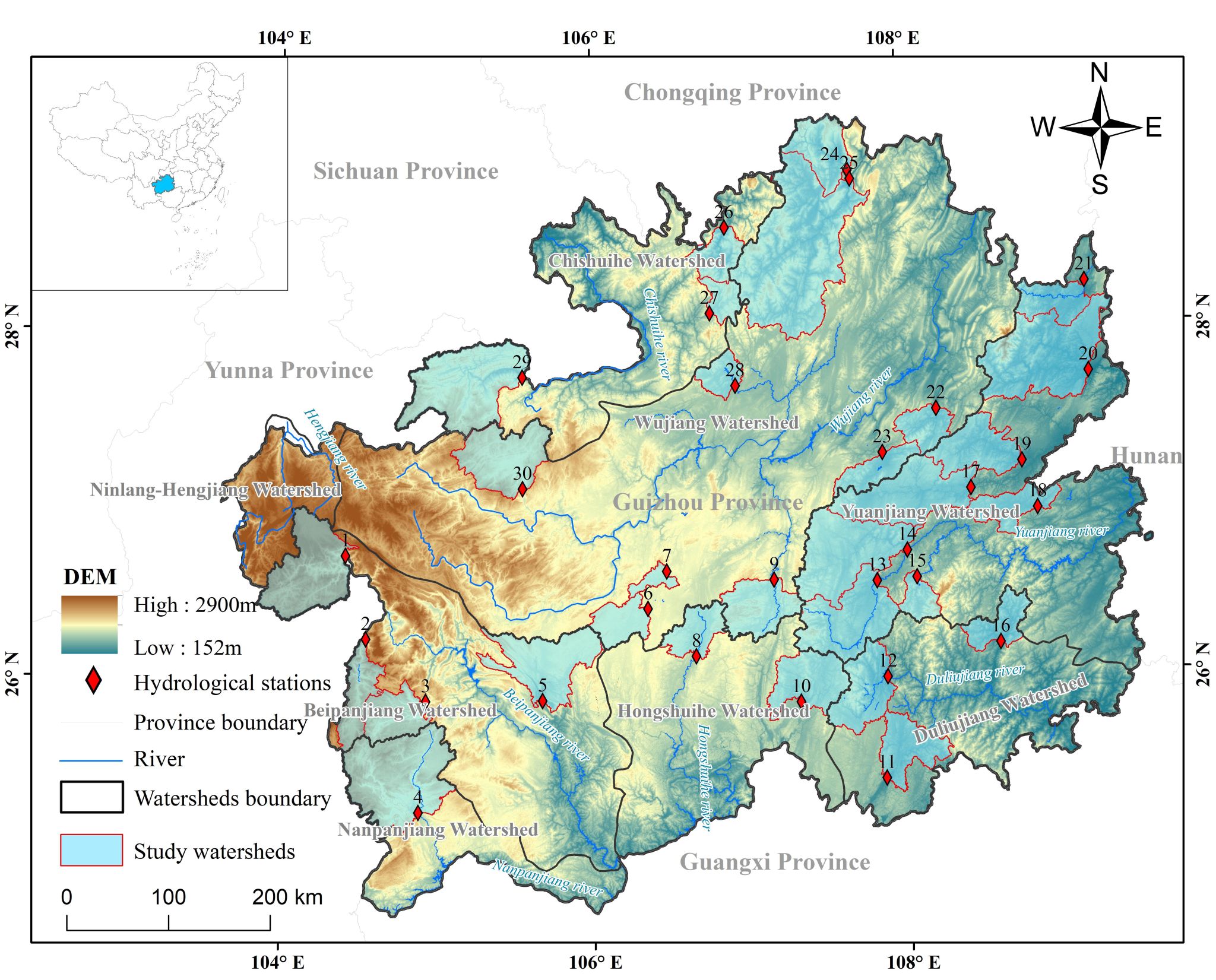
Figure 1. Locations of the study watersheds, river systems, and hydrological stations.
Figure 2. (a) Multiples between the maximum and minimum values of each runoff characteristic and (b) coefficient of variation of each runoff characteristic.
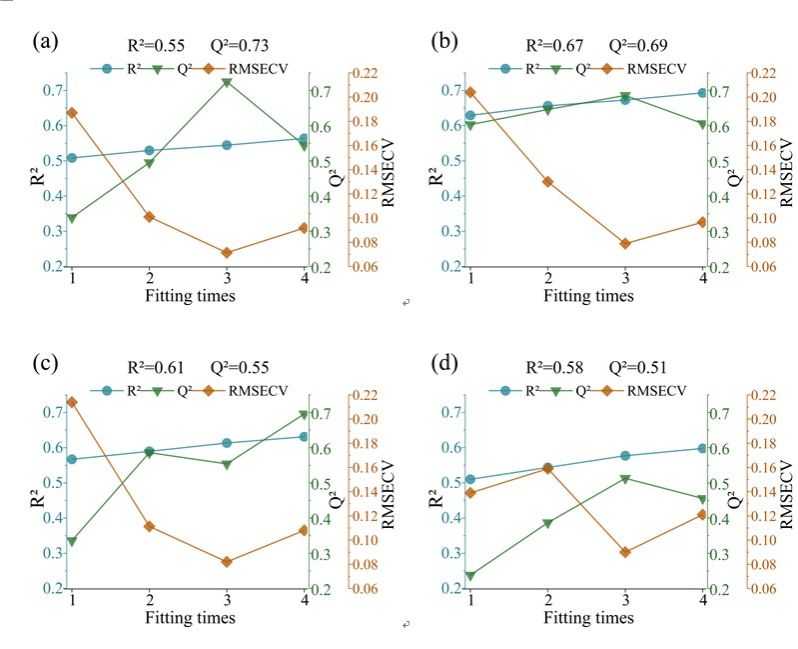
Figure 3. PLSR results of (a) RC, (b) RM, (c) REP, and (d) Cv.
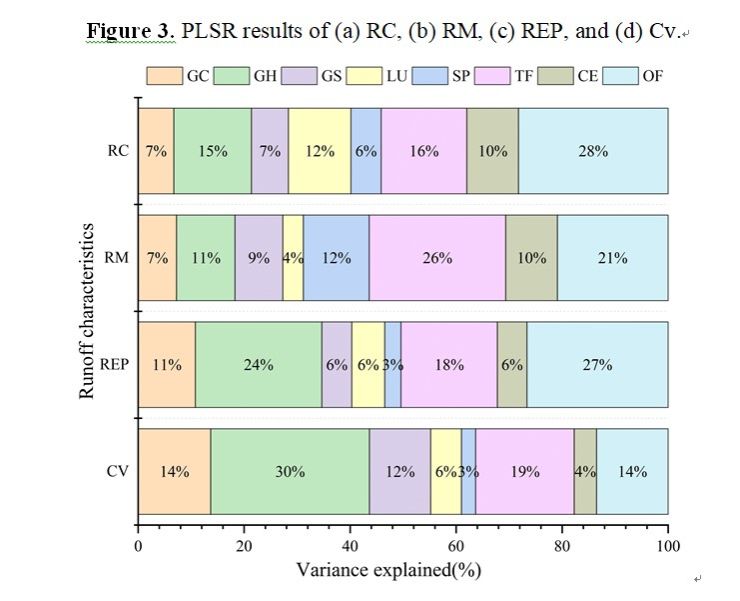
Figure 4. Contribution rates of various natural factors to runoff characteristics. (GC, geochemistry; GH, hydrogeological elements; GS, geological structure; LU, land use; TF, terrain factor; SP, soil properties; CE, climate elements; OF, the contribution rate of other factors except for the above factors.)
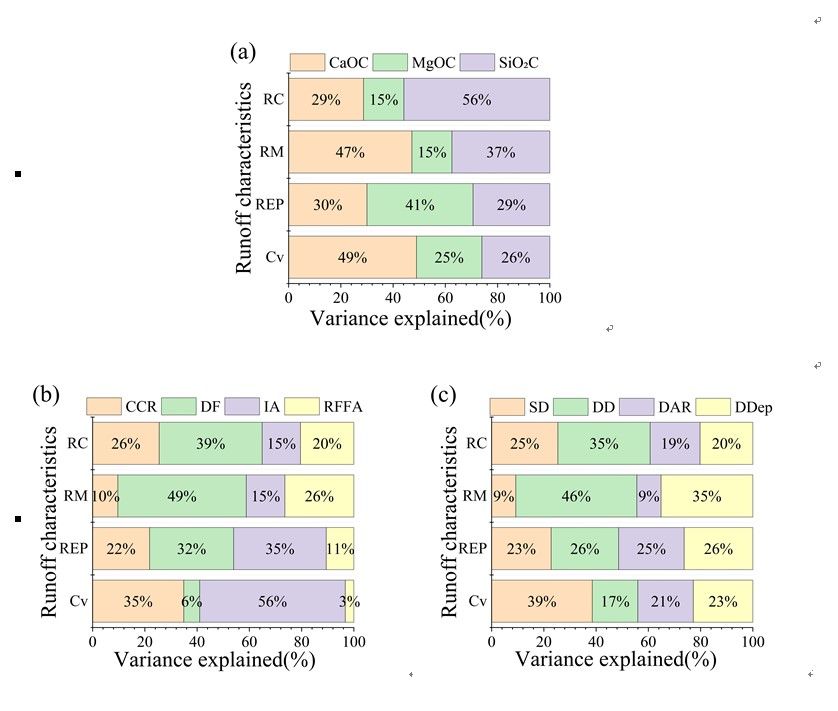
Figure 5. The contribution of (a) geochemical, (b) geological structure, and (c) hydrogeological factors to runoff characteristics.
(CaOC, CaO content; MgOC, MgO content; SiO2C, SiO2 content; CCR, carbonate and clastic interbedding ratio; DF, fault density; IA, formation dip; RFFA, the angle between the main stream direction and the formation trend; SD, spring density; DD, sinkhole density; DAR, depression density; DDep, depression depth)
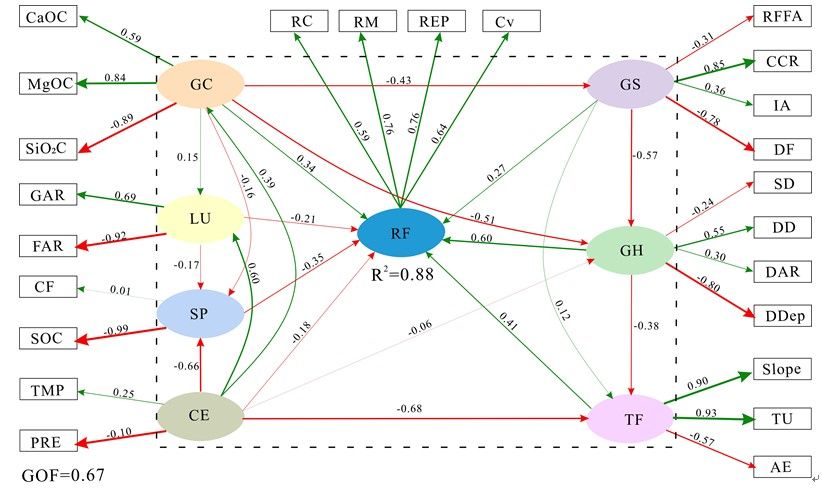
Figure 6. Path coefficients among latent variables and runoff characteristics were obtained using PLS-SEM. (The line width indicates the size of the path coefficient. The red and green lines represent negative and positive effects, respectively.GAR, grassland area ratio; AE, mean elevation; Slope, slope; TU, topographic relief; CF, soil gravel content; SOC, soil organic carbon content; TMP, average annual temperature; PRE, average annual precipitation.)
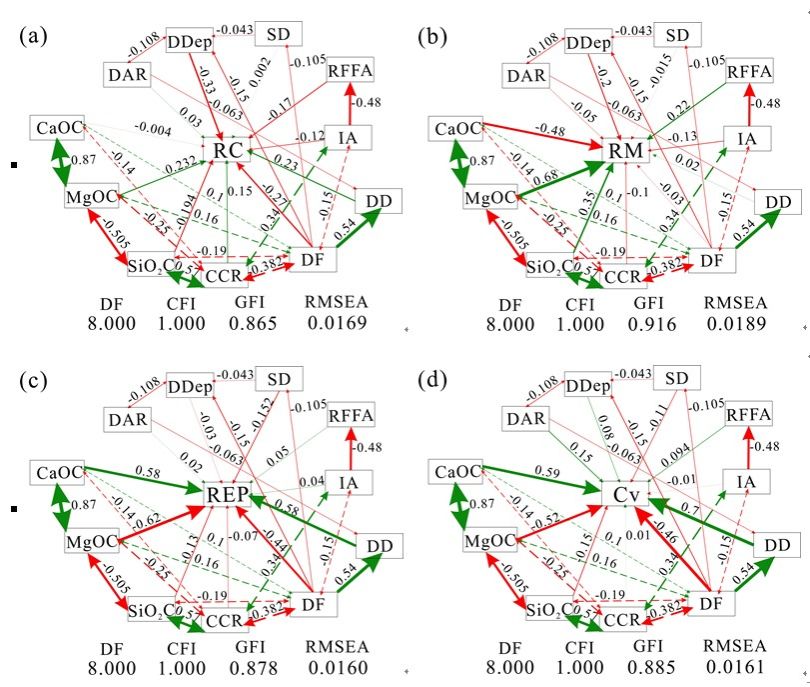
Figure 7. Influence of geological factors on (a) RC, (b) RM, (c) REP, and (d) Cv. (The line width indicates the size of the parameter. The double arrows represent the correlation, the red and green lines represent the negative and positive effects, respectively, and the nonsignificant effects are indicated by dotted lines.)
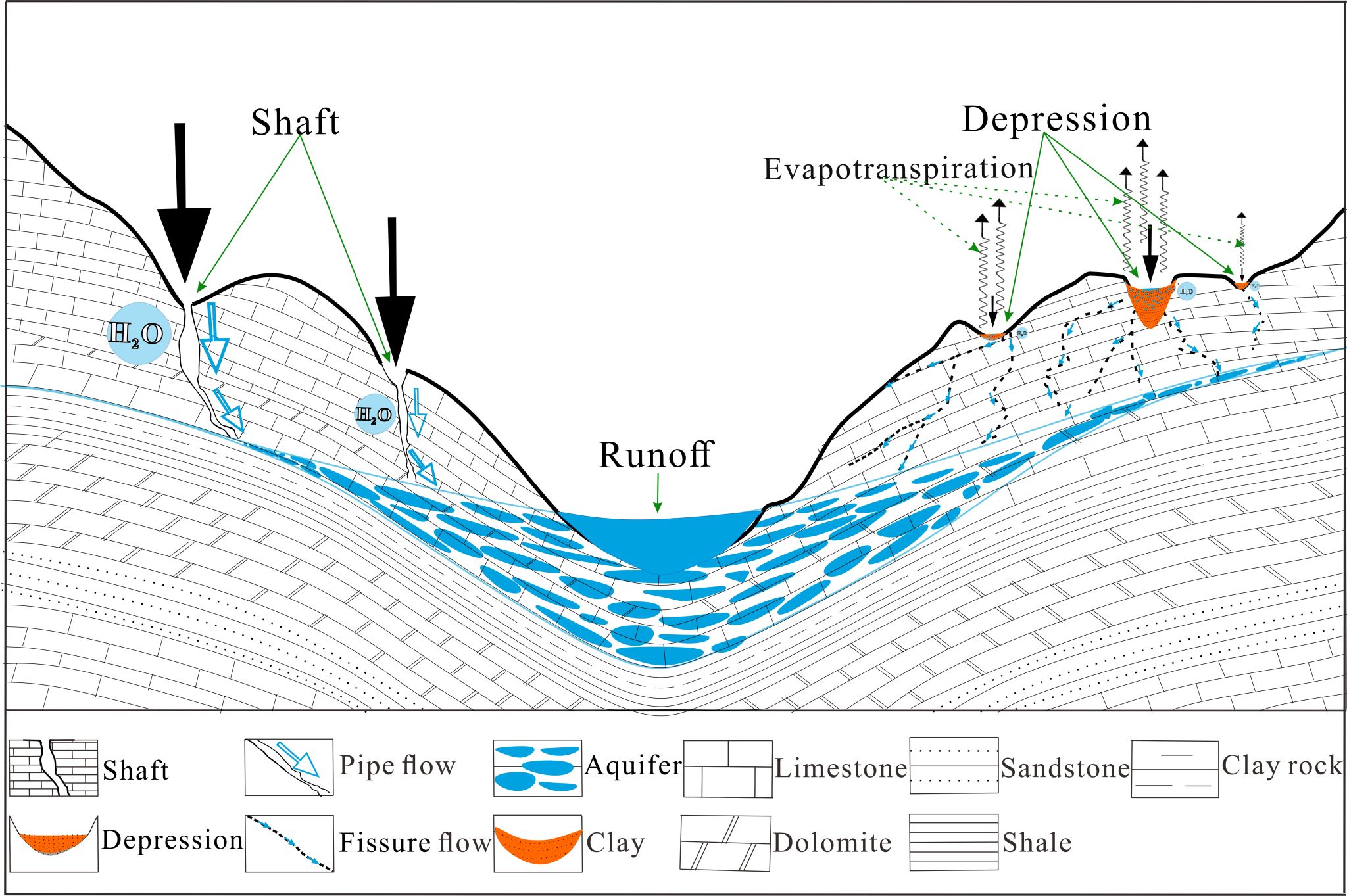
Figure 8. Comparison of water infiltration patterns between sinkhole and depression. (The shaft on the left is a channel through which water seeps rapidly. On the other hand, the infiltration rate of water in the depression on the right is slower, resulting in part of the water being consumed in evapotranspiration
项目资助:得到国家自然科学基金委员会-贵州省人民政府喀斯特科学研究中心联合基金(U1812401)、贵州省基础研究计划项目(黔科合基础[2019]1433)、贵州省科技计划项目(黔科合平台人才[2017]5726),国家自然科学基金(41761003 & 41801293),贵州省高等学校杰出人才基金项目([2018]042)等项目的联合资助。
期刊简介:The Journal of Hydrology publishes original research papers and comprehensive reviews in all the subfields of the hydrological sciences including water based management and policy issues that impact on economics and society. These comprise, but are not limited to the physical, chemical, biogeochemical, stochastic and systems aspects of surface and groundwater hydrology, hydrometeorology and hydrogeology. Relevant topics incorporating the insights and methodologies of disciplines such as climatology, water resource systems, hydraulics, agrohydrology, geomorphology, soil science, instrumentation and remote sensing, civil and environmental engineering are included. Social science perspectives on hydrological problems such as resource and ecological economics, environmental sociology, psychology and behavioural science, management and policy analysis are also invited. Multi-and interdisciplinary analyses of hydrological problems are within scope. The science published in the Journal of Hydrology is relevant to catchment scales rather than exclusively to a local scale or site.
According to the Journal Citation Report (JCR) of the Institute for Scientific Intelligence (ISI), the latest impact factor of the journal is 6.4 (2023), and it is a Zone 1 Top journal in the CAS division.
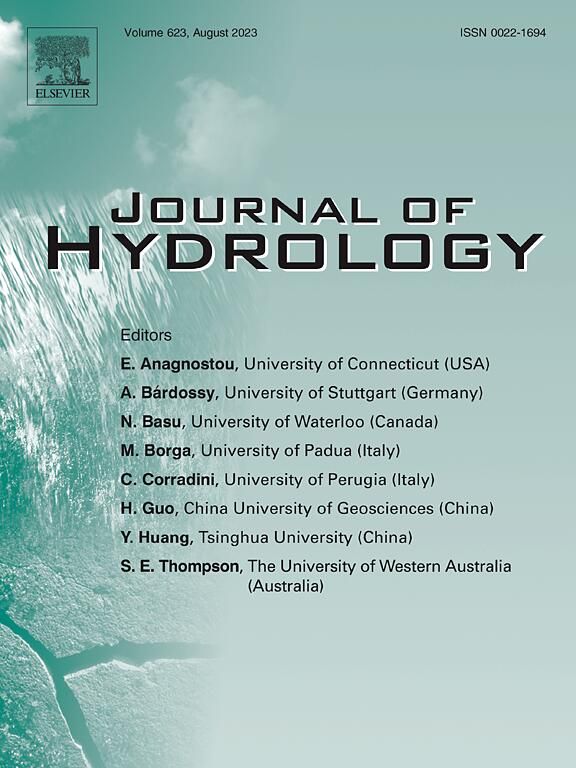
第一作者简介:罗应忠,男,彝族,1999年4月生,贵州威宁人,群众,系太阳成集团tyc122cc2021级自然地理学硕士研究生。 2023年荣获“研究生国家奖学金”、省级“三好员工”等荣誉称号与奖励,研究方向为生态水文过程与模拟。目前在研期间取得代表性研究成果如下:
[1] Yingzhong Luo, Qiuwen Zhou*,Dawei Peng, Weihong Yan and Mantong Zhao. (2023). Key Influence of Hydrogeological, Geochemical, and Geological Structure Factors on Runoff Characteristics in Karst Catchments. Journal of Hydrology, 623, 129852.
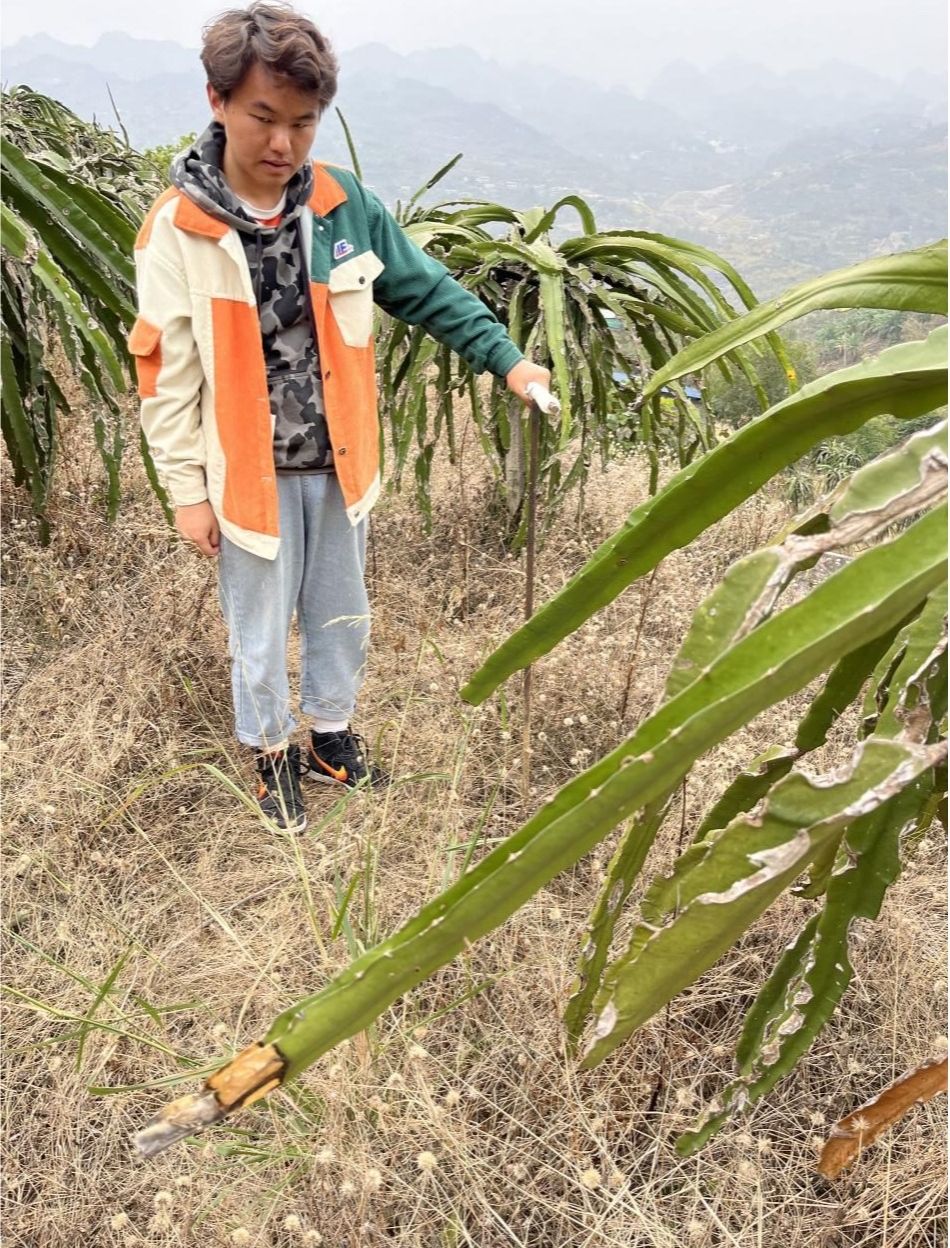
通讯作者简介:周秋文,男,广西桂林人,教授,博士生导师,课程思政国家级教学名师。美国德州农工大学(Texas A&M University, TAMU)访问学者,主要研究领域为喀斯特地貌与生态水文遥感。获贵州省自然科学一等奖(2018),贵州省测绘科技进步二等奖(2017)。主持国家自然科学基金项目:喀斯特江河上游区植被恢复的水文综合响应研究(41761003),作为骨干参与国家自然科学基金、国家科技支撑计划课题、水利部公益性行业专项6项。主讲课程《自然地理学》、《水文学》。国家自然科学基金委项目函评专家,《Water Resources Research》、《Hydrology and Earth System Sciences》、《Journal of Hydrology》、《Science of the Total Environment》等期刊的审稿专家。目前已在《Journal of Hydrology》、《Science of the Total Environment》等SCI期刊上发表学术论文30余篇。

成果链接:本期推送“Yingzhong Luo, Qiuwen Zhou*,Dawei Peng, Weihong Yan and Mantong Zhao. (2023). Key Influence of Hydrogeological, Geochemical, and Geological Structure Factors on Runoff Characteristics in Karst Catchments. Journal of ydrology, 623, 129852. ”
文章原文链接:https://doi.org/10.1016/j.jhydrol.2023.129852
一审(校):谢小兰;二审(校):吴沂晓;三审(校):赵翠薇

